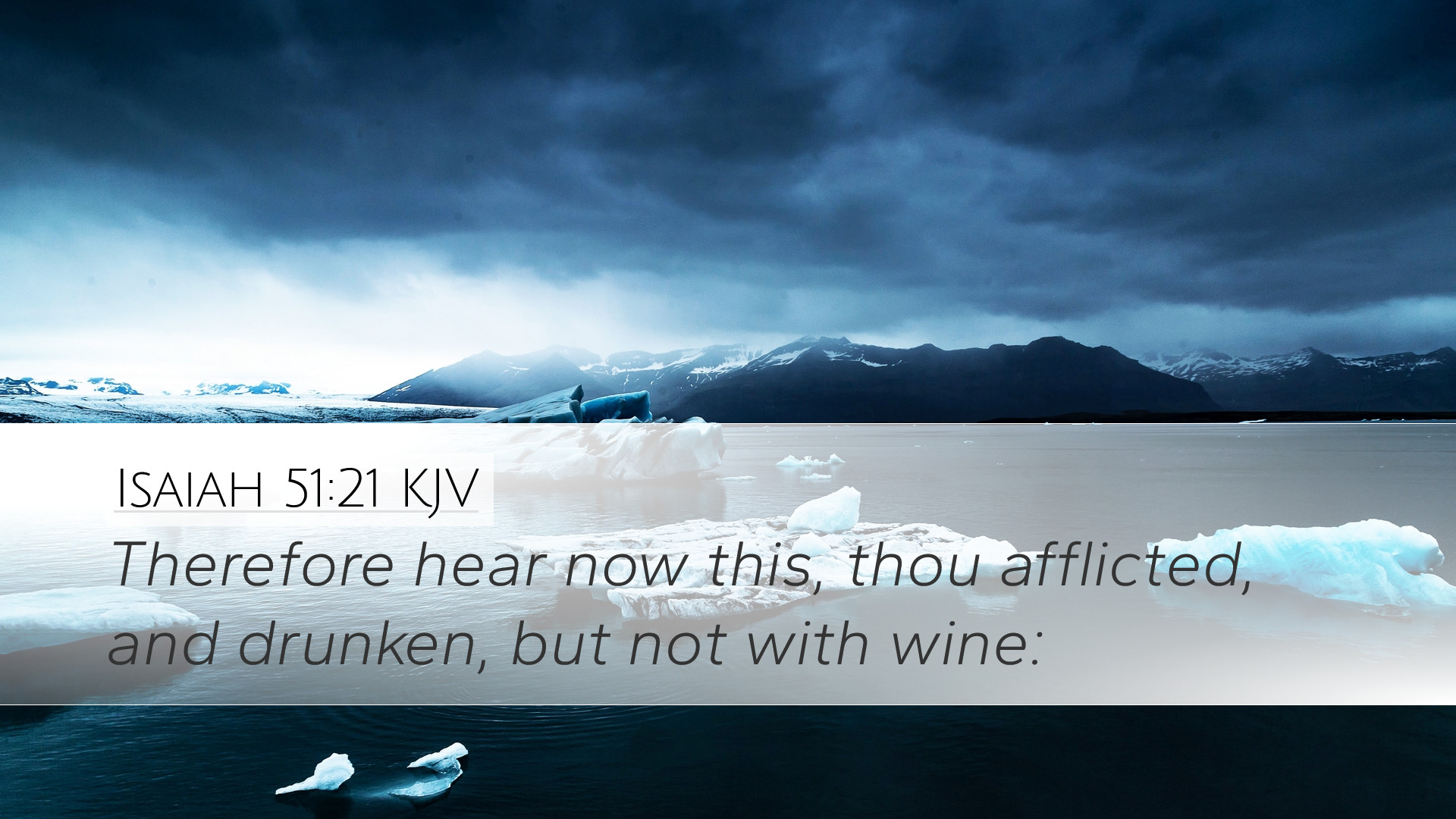Commentary on Isaiah 51:21
Isaiah 51:21 states: "Therefore hear this, you afflicted, and drunken, but not with wine." This verse serves as a pivotal point within a larger prophetic discourse that offers both admonition and consolation.
Contextual Overview
This chapter is part of the second section of Isaiah, often referred to as the "Book of Comfort." Here, the prophet addresses the exiled people of Israel, reminding them of God's promises and urging them to trust in His deliverance. The opening commands to "hear" imply a critical importance in the following messages.
Afflicted and Drunken
The term "afflicted" signifies those who are suffering, weary, and weary from their circumstances—likely a reference to the people of Israel during their Babylonian exile. The phrase "drunken, but not with wine" presents a metaphorical interpretation which suggests a state of confusion, despair, and disorientation that has resulted from oppression rather than literal intoxication.
Matthew Henry comments that this drunkenness symbolizes the overwhelming sorrow and distress that the people cannot properly comprehend or articulate. They are inebriated by their grief, similar to one who is rendered insensible through drink.
Insight from Albert Barnes
Albert Barnes observes that this verse serves a dual purpose: it identifies the emotional and spiritual condition of the Israelites, while simultaneously initiating a call toward renewal. He emphasizes that the affliction is not simply a physical state but deeply spiritual—representing a disconnect from faith.
Barnes also clarifies that this state of drunkenness relates to the false sense of security that can come in times of trial, when individuals may feel overwhelmed and unable to cope with the harsh realities of life. Such conditions often lead to despair, which can, paradoxically, lead one back toward a questioning of faith.
Understanding the Call to Hear
The imperative nature of the phrase "hear this" cannot be overlooked. It signifies a divine summons, an invitation to listen carefully to what God is saying about their situation. There is a recognition that the people's perception of their circumstances must change; they need to attune themselves to the voice of God.
Adam Clarke notes that the divine message often comes amidst chaos, and it is within this chaos that God’s truth shines clearly. The assault of doubt and despair should not drown out the hopeful messages that God is imparting through the prophet Isaiah.
The Nature of God’s Comfort
This verse foreshadows the comfort that God is about to extend to His people. It serves as a reminder that their suffering is not overlooked by God and that He has the power to transform their conditions. The subsequent verses continue to develop this theme, depicting God’s role as a powerful Redeemer. Pastors and theologians alike must emphasize this theme of transformative hope amid despair.
Divine Presence Amidst Suffering
In the subsequent verses, Isaiah reinforces the truth that even in their affliction, God's ultimate design is to restore and redeem. This is decidedly important for contemporary application; believers today may feel similarly afflicted and must learn to listen to God's assurances.
Theological Implications
This passage raises important discussions concerning the nature of God as comforter and redeemer. The duality of affliction and comfort presents a foundational truth in Christian theology: suffering is real, yet it is tempered by the profound grace and mercy of God. The insights from Henry, Barnes, and Clarke converge around this central theme.
- Matthew Henry: The obscurity of purpose in suffering opens pathways for faith development.
- Albert Barnes: Achieving clarity amidst confusion begins with listening for God’s truth.
- Adam Clarke: God’s promises persist regardless of circumstances.
Practical Applications for Ministry
For pastors and ministry leaders, this verse is a rich resource for teaching. Reflecting on the conditions of the afflicted can lead to powerful sermons that relate to the struggles of the congregation. Here are some applications:
- Encourage congregants to share their experiences of affliction; the church should be a safe space for all.
- Remind the afflicted of God's promises and the importance of listening to His word for empowerment.
- Develop small group discussions that encourage members to explore their experiences with despair and recognize God's presence even in dark times.
Conclusion
Isaiah 51:21, while rooted in the historical context of Israel's exile, transcends time and speaks to the human condition of suffering and affliction. The command to "hear this" is a clarion call to all believers, emphasizing the need to listen for God’s truth amidst our trials. The insights from public domain commentaries not only enrich our understanding of this scripture but also guide us in providing comfort and hope to others.
As individuals engage with this verse, they are invited to find solace in the knowledge that God sees their struggles and is active in delivering them from their state of despair.


